The story of Guns N’ Roses’ failed album: 17 years of turmoil, a ban in China and hardcore porn in the studio
While rumors of a possible new record continue to grow, ‘Chinese Democracy’ remains one of the great monumental failures of this century — a misstep that marked a before and after in the history of contemporary music

One of the most talked-about musical events of the year was the release of a new album by The Cure — their first in 16 years. However, there are other legendary bands who have gone even longer without releasing an album. One such band is Guns N’ Roses, who last released new material with Chinese Democracy — also 16 years ago. Recent statements by bassist Duff McKagan hint that a new album may be in the works. Yet, it’s also reasonable to be skeptical about the likelihood of their sixth album being released in 2025, given the band’s past track record: Chinese Democracy (2008) — the band’s last album of original material — took a torturous 17 years to complete. So, what happened? Quite a lot.
When Guns N’ Roses exploded onto the scene with Appetite for Destruction (1987), followed quickly by Lies (1988), they were hailed as “the most dangerous band in the world.” At a time when rock and danger seemed to be losing relevance, overshadowed by the rise of rap and rave culture, the band — then consisting of Axl Rose (vocals), Slash and Izzy Stradlin (guitars), Duff McKagan (bass), and Steven Adler (drums) — was embraced by those who refused to let rock lose its edge.
“They were a group that had the innate rebelliousness of rock in their DNA, much like the early Rolling Stones, Aerosmith, The New York Dolls, or the punk bands of 1977,” says Mariano Muniesa, music journalist for La Heavy magazine and host of Rock Star on mariskalrock.com.
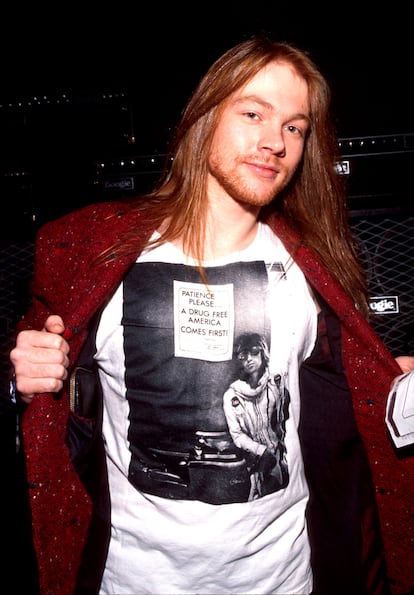
“Guns N’ Roses brought authenticity back to rock at a difficult time, and became the last great band of the genre. But, for some, they stopped being dangerous with the massive success at the tail end of the Illusions tour, when they came to Spain for the first time, in 1992,” says Anchel Solana, author of Guns N’ Roses. The Perfect Crime (2022), a two-volume book about the band in Spain. “There was so much talk about them and their extra-musical antics that a portion of the public began to see them in a very hostile way.” According to the music critic, “the band’s creativity died in September 1991, when Izzy Stradlin left. They never managed to release an original song after his departure.”
César Martín, editor-in-chief of Popular 1 magazine, agrees. “Their most exciting period ended when Izzy Stradlin left and Use Your Illusion was released. Their 1991 tour, before the album came out, was explosive, wild, and unforgettable — a stadium tour built around albums no one had heard yet. No one knew what to expect from one minute to the next. But after 1992, everything changed. I still enjoyed them, but the idea of having sexy backup singers and a horn section at their concerts seemed absurd. When the mammoth Use Your Illusion tour ended, it marked the end of an era.”
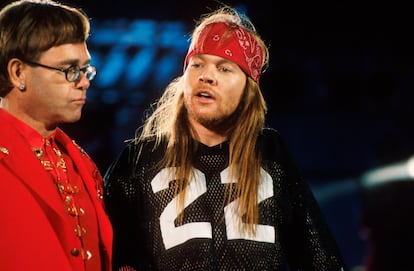
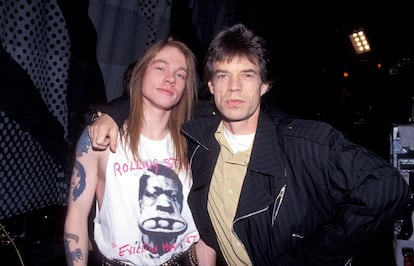
“Their sound became more commercial, and they appeared less and less in musically specialized media,” adds Alicia Rodríguez, music promoter and contributor to Ruta 66, Rockdelux, and Mondosonoro. “People were more interested in Axl Rose the figure — his fights, his quarrels with Slash, his love affairs… They even gave a new twist to their music videos, which started to border on the cheesy, like in the case of November Rain.”
How to turn your group into a dictatorship
The double album Use Your Illusion sold 35 million copies, and their tour lasted 28 months: 192 concerts in 27 countries, and it still considered the longest tour in rock history. By the time it wrapped up in 1993, Guns N’ Roses were the biggest band on the planet, with more records to break — though not necessarily the kind that would be celebrated.
In 1994, the band entered the studio to work on new material, but internal tensions started to rise. It’s said that the trouble began with Axl Rose’s decision to replace guitarist Gilby Clarke (who had stepped in for Stradlin) with his friend Paul Tobias, without consulting the rest of the band. Slash accused Axl of running the band “like a dictator” and left. Drummer Matt Sorum (who referred to Tobias as “the Yoko Ono of Guns N’ Roses”) soon followed, and by 1997, bassist Duff McKagan had also left, complaining that the band had rented a studio for three years without finishing a single song. To make matters worse, the band members were often left waiting for Axl, who would show up at odd hours.


Of the Illusion line-up, only the vocalist remained, and he began to experiment with various musicians. Among the new additions were guitarist Robin Finck (Nine Inch Nails), bassist Tommy Stinson (The Replacements), and even Queen’s Brian May, who played guitar at some rehearsals. In a 1999 interview with MTV, the band’s “dictator” claimed that, during the sessions, he had re-recorded Appetite for Destruction with the new lineup.
The band worked with a variety of producers over the years, including Youth (U2, The Verve) in the early phase. Later, Rose worked with Moby, Mike Clink, Eric Caudieux, and, finally, Sean Beavan. By mid-2000, it seemed that the album was finally finished and would be titled, jokingly, 2000 Intentions. But that’s when the debacle began. Rose hired Roy Thomas Baker, Queen’s producer, who convinced him to record everything from scratch. Drummer Frank Ferrer was replaced by another drummer named Brain, who was forced to replicate the previous drummer’s parts, transcribed on a teleprompter like one used by TV presenters.
Another significant change came when Finck rejoined Nine Inch Nails and was replaced by Buckethead, an eccentric guitarist who always wore a mask and a KFC bucket on his head. Crazy rumors soon emerged, including one that Buckethead was actually Slash in disguise. There were also bizarre anecdotes, like when Buckethead, frustrated by the chaotic recording process, threatened to leave the band. Tom Zutaut, the man who had discovered Guns N’ Roses, was brought in to help finish the album. To convince Buckethead to stay, Zutaut had a giant chicken coop installed in the studio, complete with straw, wire, and rubber chickens. Only he and the assistant engineers were allowed inside when adjusting the microphones.
But the eccentric guitarist didn’t just use the coop to play guitar — he also watched hardcore porn in it. According to Zutaut, one day one of Axl’s dogs defecated in the coop, but Buckethead insisted they leave it, saying he liked the smell. After three days, the stench became unbearable for the studio staff, and they finally removed everything, much to Buckethead’s anger.
We have a title
By 2001, the tentative name for the album was Chinese Democracy, and that name was also used for the band’s tour. But the tour turned out to be disastrous, with concerts repeatedly delayed or even cancelled. Two years later, the record label funding the album, Geffen, began to balk at the excessive costs of the recording. By that time, Chinese Democracy was considered the most expensive album in history, costing an estimated €13 million ($13.6 million) in 2004.
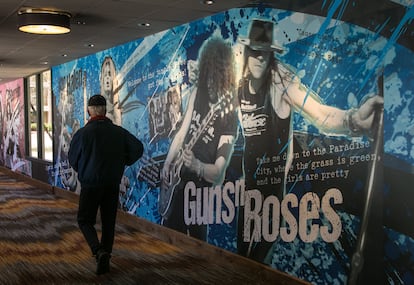
Chinese Democracy was finally released on November 22, 2008. The band recorded 50 songs, of which 14 were included in the final version. The credits listed 17 musicians, 10 producers, sound engineers, and 29 assistants. It sold a million copies in Europe and another million in the United States, which was considered a commercial failure, far below expectations. The Chinese Democracy Tour lasted from 2001 to 2011, and according to a security agent’s statement, there were orders to prevent anyone wearing a Slash T-shirt from entering the concerts. As a final twist, the album was banned in China because the title was considered a critique of the country’s political regime.
As for the content, it was met with mixed reviews, though negative ones predominated. However, César Martín defends it: “Axl basically became the Norma Desmond of rock. If you watch Gloria Swanson in Sunset Boulevard, that’s Axl in the late 1990s. I thought it was wonderful, I won’t deny it! I really like that phase of his. It was total nonsense, though, because the album ended up being released when almost no one was buying music anymore. If he’d released it a few years earlier, it would have sold a lot more. But I love Chinese Democracy. It’s amorphous, strange, and wonderful! Though, I consider it an Axl solo project, not a Guns N’ Roses album.”
“I know Tommy Stinson personally, and he told me that Jimmy Iovine, the president of the label, and producer Roy Thomas Baker, killed the album,” says Anchel Solana. “When the label pulled the plug in 2004, they released Greatest Hits, which Axl, Slash, and Duff tried to prevent separately by all means. The compilation was a huge success, it is one of the best-selling albums of this century. But by then, Chinese Democracy was already dead. It was an album that should have come out in 2001 at the latest. By 2008, it no longer made sense. Even so, it’s a solid work by Axl.”
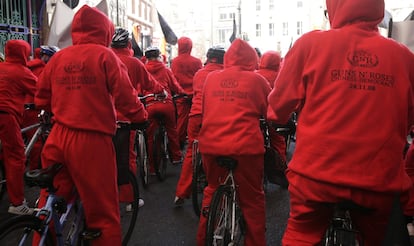
For Mariano Muniesa, however, Chinese Democracy was “a disjointed album of scraps, pretending to be modern without achieving it, and weak — very weak — in all aspects.”
Alicia Rodríguez also considers it a minor work: “I am not a fan of the electronic and industrial textures it incorporates. I think the long wait hurt it, because when you take so long and don’t release the masterpiece that fans expect, it becomes irremediably disappointing. Also, it has a sound so different from the previous albums that those of us who loved the spontaneity of their early days were left feeling lukewarm.”
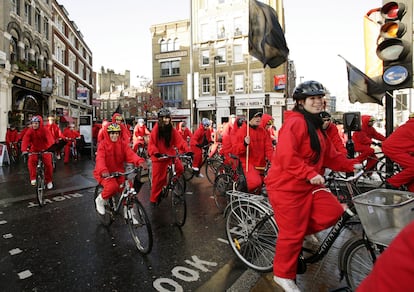
Never say never
The differences between Axl and Slash seemed as irreconcilable as those between Morrissey and Johnny Marr of The Smiths. In a 2009 interview with Billboard magazine, the frontman declared: “What’s clear is that one of the two of us will die before a reunion.” Three years later, when asked about the same topic, he said: “Not in this lifetime.” Yet, in 2016, he ate his words and announced a reunion tour dubbed the Not In This Lifetime… Tour, with Slash and Duff McKagan back in the lineup. The tour featured a greatest hits repertoire — virtually no Chinese Democracy songs — and became the second highest-grossing tour in history (only U2′s 360º Tour grossed more). It continued until last year, and this served as the long-awaited germ of a possible return to the studio for the three charismatic original members.
But has Guns N’ Roses regained any of that initial greatness, or are they now seem more like a tribute band to themselves? “What band isn’t that these days?” admits Anchel Solana. “Even younger bands like The Strokes — huge Guns N’ Roses fans, by the way — are already an absolute act of nostalgia!”
“Axl is a very clever guy, and he knows he needs Slash, who for me is 50% of the group,” says Alicia Rodríguez. “I know few bands with the live performance capacity of Guns, and I can think of many others that have become tributes to themselves. However, they are less criticized than Guns N’ Roses. You can criticize them for certain things, but they always deliver what they promise: rock concerts in the wild, without any social or philosophical background in their songs, which don’t need it.”
For César Martín, “Nowadays, Guns N’ Roses offer very professional and enjoyable concerts, but this no longer has anything to do with the band we went wild over in another era. In their heyday, they were a dangerous, wild band, and now they’re simply entertainers. It’s like going to see the Eagles or Fleetwood Mac — that kind of experience: legendary groups that play their classics in stadiums. People pay fortunes for tickets to special areas of each stadium and all that stuff, which, in my opinion, has nothing to do with rock. But I will always enjoy seeing Axl on stage with Duff and Slash. That’s not going to change.”
“They brought back to rock an attitude and a feeling of rebellion, nonconformity, and thugishness that was initially sincere, genuine, and raw, and that was perfectly captured in their first album,” concludes Mariano Muniesa. “They showed that rock had to continue disturbing conservative minds, it had to be rebellious, not accommodating, not conventional. That is the best legacy they left, and I understand that it’s still alive, even if it’s not noticeable.”
Sign up for our weekly newsletter to get more English-language news coverage from EL PAÍS USA Edition
Tu suscripción se está usando en otro dispositivo
¿Quieres añadir otro usuario a tu suscripción?
Si continúas leyendo en este dispositivo, no se podrá leer en el otro.
FlechaTu suscripción se está usando en otro dispositivo y solo puedes acceder a EL PAÍS desde un dispositivo a la vez.
Si quieres compartir tu cuenta, cambia tu suscripción a la modalidad Premium, así podrás añadir otro usuario. Cada uno accederá con su propia cuenta de email, lo que os permitirá personalizar vuestra experiencia en EL PAÍS.
¿Tienes una suscripción de empresa? Accede aquí para contratar más cuentas.
En el caso de no saber quién está usando tu cuenta, te recomendamos cambiar tu contraseña aquí.
Si decides continuar compartiendo tu cuenta, este mensaje se mostrará en tu dispositivo y en el de la otra persona que está usando tu cuenta de forma indefinida, afectando a tu experiencia de lectura. Puedes consultar aquí los términos y condiciones de la suscripción digital.








































